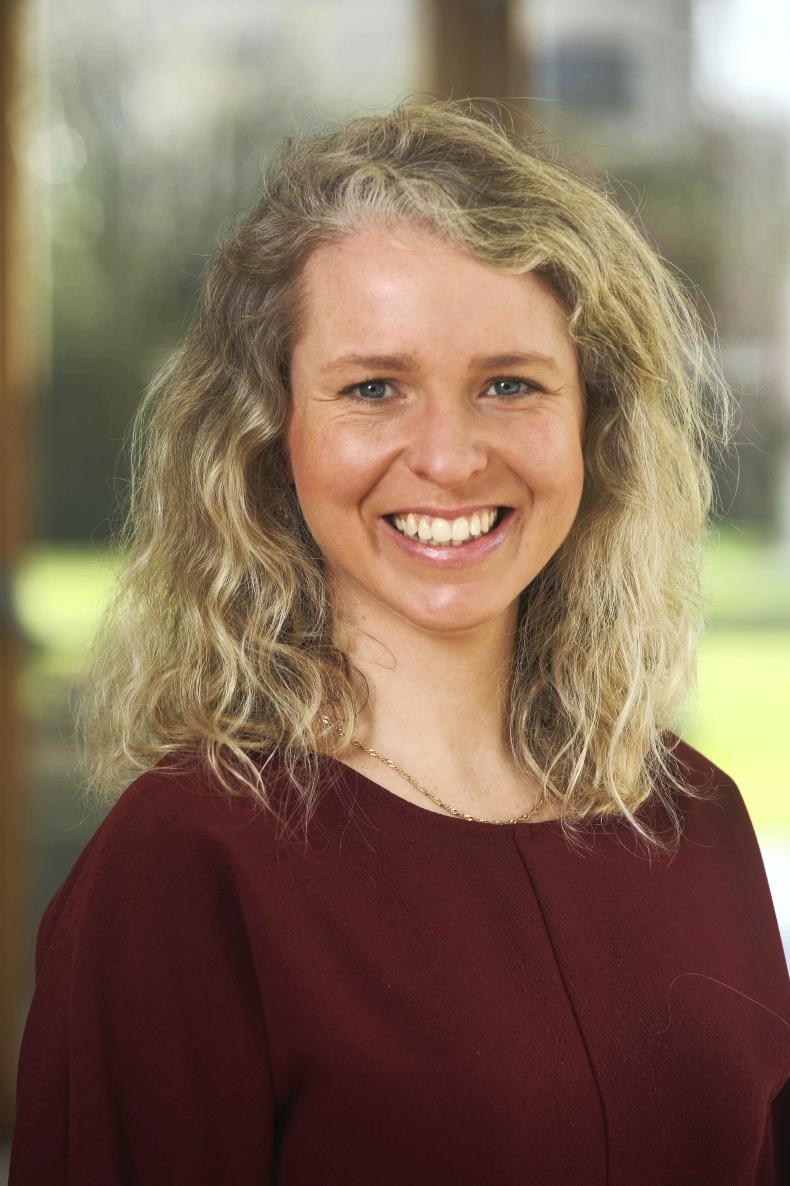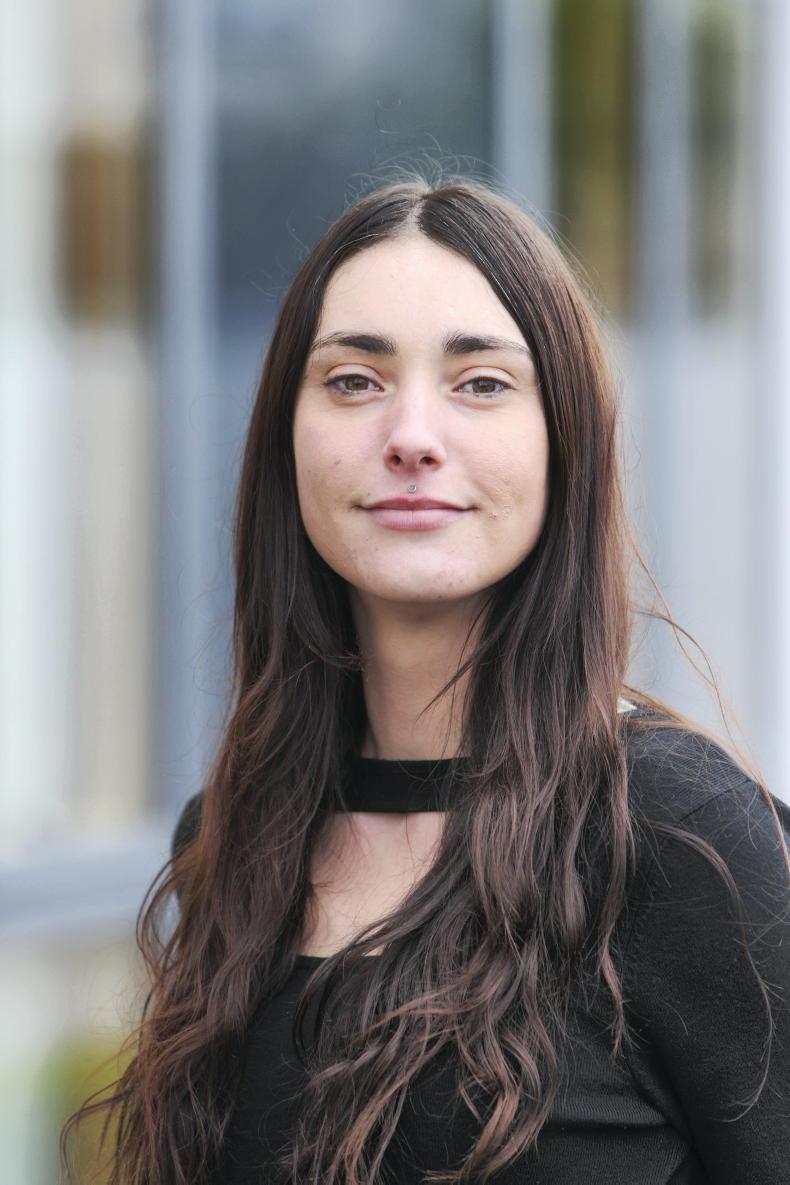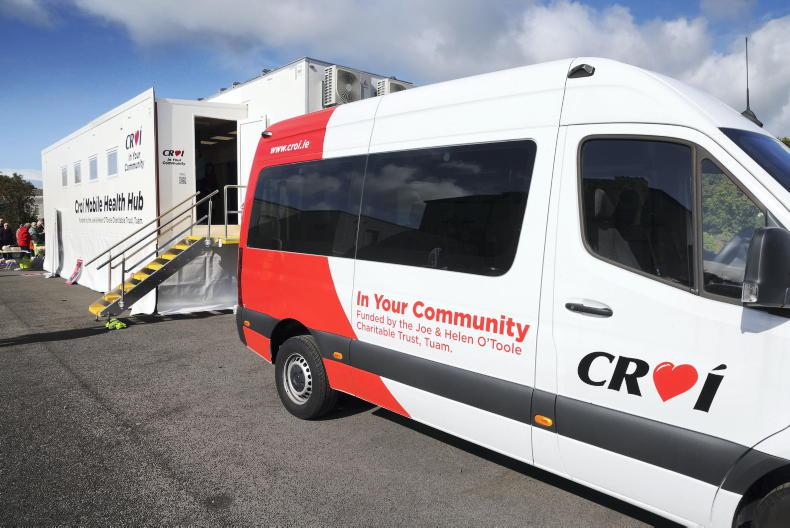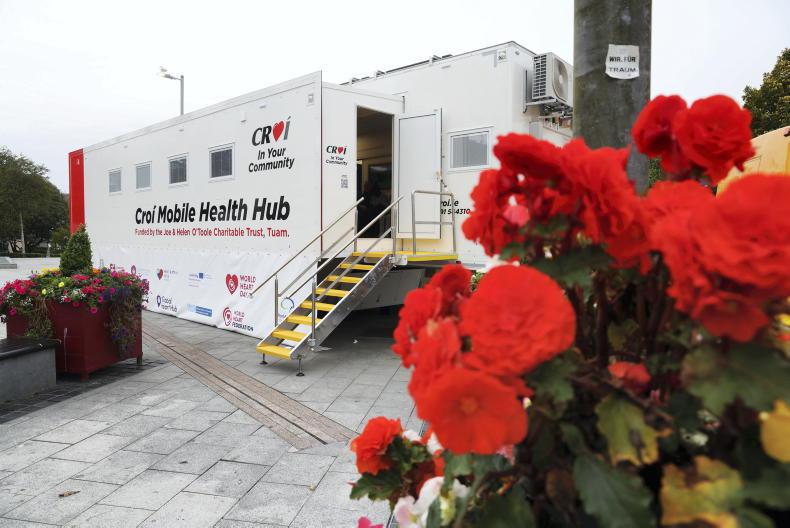Getting farmers to take better care of their physical and mental health is no mean feat, but a charity based in the west of Ireland is finding that the fear of not being on their farms tomorrow is spurring more and more men and women in agriculture to take action today.
Croí, the heart disease and stroke charity, is bringing its screening services from Donegal to Clare and further south to Cork, as it aims to reach out to people to advise them of the benefits of better heart health.
Based in a dedicated centre in Galway, where it recently opened a new, state-of-the-art Community Stroke Hub, the charity is helping people in rural Ireland to take better care of themselves, with those who have suffered a cardiac or stroke event, receiving rehabilitation support.
The hub is the first of its kind in the west of the country, and is also supporting carers and families of those who have suffered a stroke.
A recent philanthropic donation by a Galway business family has delivered a fleet of new Croí vehicles on the road, including a minibus which brings stroke survivors into the hub to avail of rehab and support services.
Dr Lisa Hynes is a health psychologist and head of health programmes with the charity. She says the bequest by the late Joe and Helen O’Toole from Tuam has been transformational in how Croí is able to engage with a much wider demographic.

Dr Lisa Hynes, Head of Health Programmes Croí.
“Our Stroke Hub launched in January but we’ve been working in stroke prevention for a number of years, with specific programmes for clients developed over the last three years,” she explains.
“The O’Toole Trust donation made the hub possible, along with a PhD scholarship to support research into stroke prevention and recovery. We were also able to purchase three vehicles; a minibus to transport service users to the hub, and two mobile vehicles which contain our screening service unit that goes out into the community on a weekly basis to offer screening and early intervention throughout the west and northwest in places that people wouldn’t have access to such services.
“We have also worked in partnership with the Irish Farmers Association, where we’ve been able to go into marts throughout the region and meet people where they are at. We’ve been able to offer blood pressure screening and advise men who may be at risk to seek further medical advice as high blood pressure can be an indicator of increased stroke risk. If it’s detected early, it is treatable with lifestyle changes such as exercise and diet, or with medication.”
Dr Hynes says the reception the Croí team have received from the public has shown that people want to be proactive in the prevention of cardiac or stroke-related health issues.
“The response we’ve had among the farming community has been really positive and we’re really thankful to the IFA for the connection we’ve formed as they’re encouraging their members to engage with the screening,” she says.
“Men aren’t typically too concerned about health matters, but they do have a real fear of not being on the farm tomorrow were something to happen to them. That has come across as a big concern for the farmers we have met.
“Prevention is relevant to everyone, regardless of age or medical history, and the message we try to get across is that while there are things we can’t control when it comes to our risk of stroke and cardiovascular illness, such as age, gender and ethnicity, there is a lot we can do. Getting more exercise and being aware of our own bodies are two ways people can maintain healthy lives and that is the message we are trying to get across because the incidence of premature cardiovascular illness in Ireland is too high.”
Stroke survivors
The new Stroke Hub is hosting a range of classes for those who have survived a stroke to help them manage their health once they leave hospital.

Beatriz Gomez Maestre, Community Stroke Support Specialist Croí.
Beatriz Gómez Maestre, community stroke support specialist explains the different services stroke survivors can avail of through the charity.
“We offer two different programmes from Croí House for our clients and their carers and family members,” she says.
“We look at the gaps in people’s knowledge of stroke risk factors and we teach people what they need to know. We also offer physical activities and exercise to help our clients get stronger and fitter post-stroke.
“There is also an educational element to the programme and our rehabilitation service includes cognition therapy where we help people to work on their memory and attention span which can be badly affected by stroke.
“Our youngest participant on our current course is 42 while the eldest lady is 88.”
Listening to your body
Irish Country Living attended one of the ‘My Stroke’ classes, a four-week pilot programme offered to 12 people living throughout Co Galway who have survived a stroke.
The class offers strategies for healthy living, including an understanding of fatigue which is one of the most common symptoms post-stroke.
John Kelly from Claregalway had a stroke at the age of 48. A serving Garda at the time, he said he had no warning symptoms until he lost power along his left side.
“The support offered by Croí is wonderful, it is great to come in here every week and meet people who are going through the same thing as you, as well as learning how to protect yourself from future stroke risk,” he says.
Beatriz teaches the class and urges the participants to listen to and respond to their bodies as a sign of when to rest.
“Fatigue is one of the most common side effects from stroke and that is emotional, mental and physical fatigue,” she says.
“We need to learn to plan our days, around the tasks we want to do relating to our energy levels, and factor in breaks even when we don’t necessarily feel tired.
“But if we are careful in the way we use our energy, by taking a 10-minute break after every 20 minutes of whatever task we are doing, that way we reduce the risk of being overwhelmed.”
Dr Hynes says the need for services has grown since the charity opened Croí House in 2012, with over 7,200 people engaging with the Croí Health Team in the community in 2024 alone.
“The Stroke Hub has given us a dedicated space for community services in Croí House, which opened in 2012 and has grown massively since then,” she says.
“Clients being discharged from hospital after a stroke have the necessary medications, but they report feeling like they are falling off a cliff in terms of supports so that is why our services are so badly needed.

Croí screening unit which will visit this year’s Bloom and National Ploughing Championships events.
“More people are surviving strokes now with advances in medication and a greater understanding among the public of the need to act fast when a stroke is suspected. There are a lot more people living longer after stroke than used to be the case. We provide a routine for clients, a connection and support for them to keep healing and to live their lives to the best of their ability.
“There are lots of invisible disabilities associated with stroke, such as fatigue or the psychological effect it takes on a person and these can be long term for some people.
“We aim to serve communities from Donegal to Clare and relationship development is key for us so we are developing links with the stroke clinic in Mayo University Hospital and hope to do the same with a planned unit in Letterkenny Hospital.”
Croí’s Screening Service facilitated 4,724 people at over 105 events throughout the country in 2024.Upcoming screening will be available at the following locations in the coming weeks:St Senan’s GAA Club, Kilkee, Co Clare. Tuesday, 20 May, 11am to 3pm.Douglas GAA Club, Douglas, Co Cork. Wednesday, 21 May, 10am to 2pm.O’Toole’s Super Valu carpark, Tuam, Co Galway. Thursday, 22 May, 10am to 2pm.
Getting farmers to take better care of their physical and mental health is no mean feat, but a charity based in the west of Ireland is finding that the fear of not being on their farms tomorrow is spurring more and more men and women in agriculture to take action today.
Croí, the heart disease and stroke charity, is bringing its screening services from Donegal to Clare and further south to Cork, as it aims to reach out to people to advise them of the benefits of better heart health.
Based in a dedicated centre in Galway, where it recently opened a new, state-of-the-art Community Stroke Hub, the charity is helping people in rural Ireland to take better care of themselves, with those who have suffered a cardiac or stroke event, receiving rehabilitation support.
The hub is the first of its kind in the west of the country, and is also supporting carers and families of those who have suffered a stroke.
A recent philanthropic donation by a Galway business family has delivered a fleet of new Croí vehicles on the road, including a minibus which brings stroke survivors into the hub to avail of rehab and support services.
Dr Lisa Hynes is a health psychologist and head of health programmes with the charity. She says the bequest by the late Joe and Helen O’Toole from Tuam has been transformational in how Croí is able to engage with a much wider demographic.

Dr Lisa Hynes, Head of Health Programmes Croí.
“Our Stroke Hub launched in January but we’ve been working in stroke prevention for a number of years, with specific programmes for clients developed over the last three years,” she explains.
“The O’Toole Trust donation made the hub possible, along with a PhD scholarship to support research into stroke prevention and recovery. We were also able to purchase three vehicles; a minibus to transport service users to the hub, and two mobile vehicles which contain our screening service unit that goes out into the community on a weekly basis to offer screening and early intervention throughout the west and northwest in places that people wouldn’t have access to such services.
“We have also worked in partnership with the Irish Farmers Association, where we’ve been able to go into marts throughout the region and meet people where they are at. We’ve been able to offer blood pressure screening and advise men who may be at risk to seek further medical advice as high blood pressure can be an indicator of increased stroke risk. If it’s detected early, it is treatable with lifestyle changes such as exercise and diet, or with medication.”
Dr Hynes says the reception the Croí team have received from the public has shown that people want to be proactive in the prevention of cardiac or stroke-related health issues.
“The response we’ve had among the farming community has been really positive and we’re really thankful to the IFA for the connection we’ve formed as they’re encouraging their members to engage with the screening,” she says.
“Men aren’t typically too concerned about health matters, but they do have a real fear of not being on the farm tomorrow were something to happen to them. That has come across as a big concern for the farmers we have met.
“Prevention is relevant to everyone, regardless of age or medical history, and the message we try to get across is that while there are things we can’t control when it comes to our risk of stroke and cardiovascular illness, such as age, gender and ethnicity, there is a lot we can do. Getting more exercise and being aware of our own bodies are two ways people can maintain healthy lives and that is the message we are trying to get across because the incidence of premature cardiovascular illness in Ireland is too high.”
Stroke survivors
The new Stroke Hub is hosting a range of classes for those who have survived a stroke to help them manage their health once they leave hospital.

Beatriz Gomez Maestre, Community Stroke Support Specialist Croí.
Beatriz Gómez Maestre, community stroke support specialist explains the different services stroke survivors can avail of through the charity.
“We offer two different programmes from Croí House for our clients and their carers and family members,” she says.
“We look at the gaps in people’s knowledge of stroke risk factors and we teach people what they need to know. We also offer physical activities and exercise to help our clients get stronger and fitter post-stroke.
“There is also an educational element to the programme and our rehabilitation service includes cognition therapy where we help people to work on their memory and attention span which can be badly affected by stroke.
“Our youngest participant on our current course is 42 while the eldest lady is 88.”
Listening to your body
Irish Country Living attended one of the ‘My Stroke’ classes, a four-week pilot programme offered to 12 people living throughout Co Galway who have survived a stroke.
The class offers strategies for healthy living, including an understanding of fatigue which is one of the most common symptoms post-stroke.
John Kelly from Claregalway had a stroke at the age of 48. A serving Garda at the time, he said he had no warning symptoms until he lost power along his left side.
“The support offered by Croí is wonderful, it is great to come in here every week and meet people who are going through the same thing as you, as well as learning how to protect yourself from future stroke risk,” he says.
Beatriz teaches the class and urges the participants to listen to and respond to their bodies as a sign of when to rest.
“Fatigue is one of the most common side effects from stroke and that is emotional, mental and physical fatigue,” she says.
“We need to learn to plan our days, around the tasks we want to do relating to our energy levels, and factor in breaks even when we don’t necessarily feel tired.
“But if we are careful in the way we use our energy, by taking a 10-minute break after every 20 minutes of whatever task we are doing, that way we reduce the risk of being overwhelmed.”
Dr Hynes says the need for services has grown since the charity opened Croí House in 2012, with over 7,200 people engaging with the Croí Health Team in the community in 2024 alone.
“The Stroke Hub has given us a dedicated space for community services in Croí House, which opened in 2012 and has grown massively since then,” she says.
“Clients being discharged from hospital after a stroke have the necessary medications, but they report feeling like they are falling off a cliff in terms of supports so that is why our services are so badly needed.

Croí screening unit which will visit this year’s Bloom and National Ploughing Championships events.
“More people are surviving strokes now with advances in medication and a greater understanding among the public of the need to act fast when a stroke is suspected. There are a lot more people living longer after stroke than used to be the case. We provide a routine for clients, a connection and support for them to keep healing and to live their lives to the best of their ability.
“There are lots of invisible disabilities associated with stroke, such as fatigue or the psychological effect it takes on a person and these can be long term for some people.
“We aim to serve communities from Donegal to Clare and relationship development is key for us so we are developing links with the stroke clinic in Mayo University Hospital and hope to do the same with a planned unit in Letterkenny Hospital.”
Croí’s Screening Service facilitated 4,724 people at over 105 events throughout the country in 2024.Upcoming screening will be available at the following locations in the coming weeks:St Senan’s GAA Club, Kilkee, Co Clare. Tuesday, 20 May, 11am to 3pm.Douglas GAA Club, Douglas, Co Cork. Wednesday, 21 May, 10am to 2pm.O’Toole’s Super Valu carpark, Tuam, Co Galway. Thursday, 22 May, 10am to 2pm. 







SHARING OPTIONS